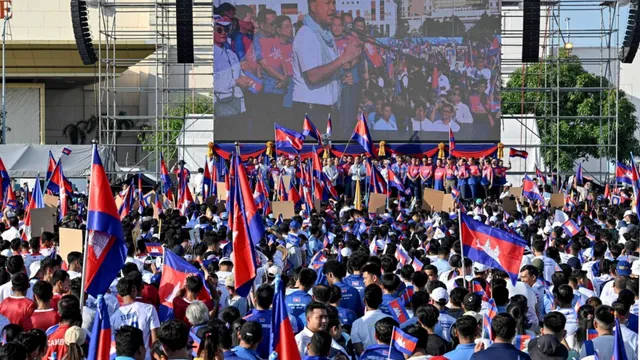
Cambodia threatens Thai produce ban amid escalating border conflict
2025-06-18 09:34- Cambodia announced plans to stop importing Thai fruits and vegetables due to border tensions following a deadly confrontation.
- Border restrictions imposed by Thailand, following the incident, have led to a series of retaliatory measures from Cambodia.
- The ongoing conflict raises concerns about the potential impact on regional trade and diplomatic relations between the two nations.
Express your sentiment!
Insights
Cambodia has recently escalated tensions with Thailand following a deadly border clash on May 28, 2023, which resulted in the death of a Cambodian soldier in a disputed area claimed by both countries. This incident prompted Cambodia to declare that it would halt all imports of Thai fruits and vegetables if Thailand did not lift new border restrictions by June 17, 2023. In response to these tensions, Thailand tightened border controls and expressed public safety concerns, suggesting that the heightened military presence at the border necessitated such measures. In retaliation, Cambodia has initiated a series of measures against Thai media, including a ban on Thai movies and dramas, as well as a reduction of internet bandwidth from Thailand. The ultimatum regarding the fruit and vegetable ban was delivered by former Cambodian Prime Minister Hun Sen in a televised address, declaring that strict measures would take effect if Thailand's border restrictions continued. Meanwhile, both sides have exchanged blame over the initial clash, further deepening the dispute. The roots of this conflict can be traced back to historical grievances, with both nations asserting claims based on colonial-era maps. Previous rulings from the International Court of Justice (ICJ) have favored Cambodia in disputes over the Preah Vihear temple, a significant flashpoint for tensions since the 1960s. Cambodia announced its intention to submit recent border issues to the ICJ, underscoring its frustration with the bilateral talks that have failed to yield resolutions. Thailand, in contrast, has expressed disappointment at Cambodia’s appeal to international arbitration, stating that it prefers resolving disputes directly through official dialogue and bilateral mechanisms. As public emotions run high, a large number of Cambodians took to the streets in Phnom Penh to demonstrate support for their government and military’s stance against Thailand. This growing nationalism on both sides of the border contributes to a volatile situation, as domestic pressures from nationalists in both countries challenge their leaders to take a hardline approach. Business communities in both Cambodia and Thailand are becoming increasingly concerned about the economic repercussions of this standoff, with calls for diplomatic solutions to restore normal trade relations and stability. The situation, fueled by both historical rivalries and modern nationalistic sentiments, continues to unfold and remains a central issue in Southeast Asian geopolitics.
Contexts
The territorial disputes between Cambodia and Thailand have a long and complex history shaped by colonial legacies, nationalist fervor, and geopolitical interests. The most notable dispute centers around the area surrounding the historic Preah Vihear Temple, a UNESCO World Heritage site, which has been the focal point of conflict between the two nations since the early 20th century. The origins of the dispute can be traced back to a 1907 French-Siamese border agreement, which ostensibly placed the temple within Cambodian territory, yet left several border demarcations ambiguous. This ambiguity has led both countries to assert historical claims over the territory, igniting tensions that have laid the groundwork for further conflicts in the years to come. In the wake of Cambodia's civil war and subsequent political instability in the 1970s and 1980s, the territorial dispute lay relatively dormant. However, with the restoration of governmental authority in the 1990s, nationalist sentiments began to rise. The issue reached a boiling point in 2008 when the Preah Vihear Temple was designated a UNESCO World Heritage site, prompting Thailand to staunchly contest this designation. Clashes between Cambodian and Thai forces ensued, with both sides deploying military personnel to the disputed area, resulting in skirmishes that caused casualties and heightened tensions. The diplomatic standoff continued, with both nations seeking resolution through international legal mechanisms, including the International Court of Justice (ICJ). In 2013, the ICJ ruled in favor of Cambodia, affirming its ownership of the Preah Vihear Temple and ordering Thailand to withdraw its military presence from the surrounding area. Although this decision was a significant legal victory for Cambodia, the dispute did not cease entirely. National pride and historical grievances propelled both governments to maintain a strong stance, with public sentiment on both sides often linked to nationalist rhetoric. Subsequent incidents involving border security and military encounters have reinforced the need for ongoing diplomatic engagement between the two countries. Currently, the territorial disputes remain a sensitive point in Cambodian-Thai relations. Both nations continue to wrestle with their historical narratives while striving for stability in their bilateral ties. Increased dialogue, along with economic cooperation initiatives that benefit both parties, are necessary to pave the way for more peaceful interactions. Furthermore, it is crucial that both Cambodia and Thailand address domestic political pressures that may influence their foreign policies, as resolving the territorial disputes will require not only legal considerations but also concessions rooted in mutual respect and understanding.